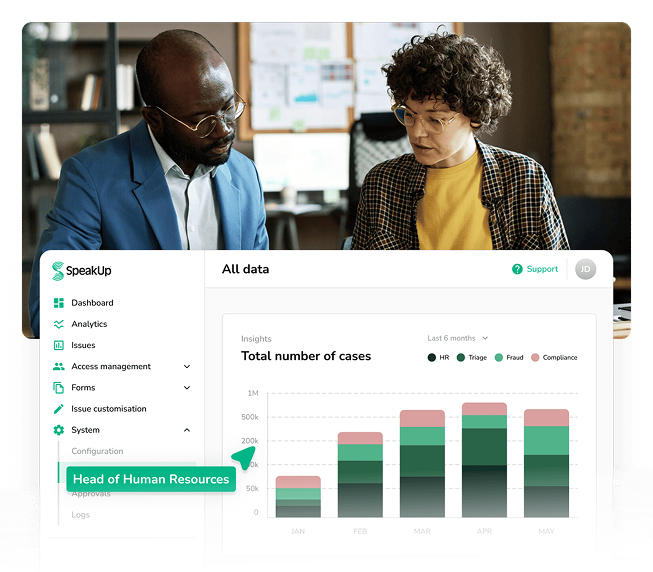Overcoming policy fragmentation in multinational compliance programs
When large, multinational organizations design their ethics and compliance programs, they often focus on the “big” initiatives, but a quieter challenge can undermine even the most well-resourced compliance function - policy fragmentation.

When large, multinational organizations design their ethics and compliance programs, they often focus on the “big” initiatives — whistleblower hotlines, investigation protocols, training, and reporting dashboards. But a quieter, more insidious challenge can undermine even the most well-resourced compliance function: policy fragmentation in case management.
This fragmentation doesn’t happen overnight. It builds as companies grow through acquisitions, expand into new markets, and adapt to jurisdiction-specific rules. Over time, what began as a unified program can splinter into a patchwork of processes, systems, and interpretations — making it harder to ensure consistency, compliance, and trust.
Why fragmentation happens in multi-entity, multinational programs
Cross-border regulatory complexity
No two jurisdictions are exactly alike when it comes to ethics and compliance laws. Whistleblower protection, data privacy, labor relations, and reporting requirements can differ not just by country, but sometimes by region or sector.
- In the EU, the Whistleblower Protection Directive requires organizations to provide timely acknowledgment, maintain confidentiality, and give feedback to whistleblowers within strict deadlines.
- In contrast, jurisdictions such as the UAE or Hong Kong may have minimal or no formal whistleblower protection laws.
For a single cross-border case, a compliance team might need to simultaneously:
- Adhere to EU GDPR rules for personal data.
- Meet U.S. Sarbanes-Oxley retaliation protections.
- Respect local labor laws that could limit the scope or pace of investigations.
Corporate structure & autonomy
Enterprise organizations often operate through subsidiaries, affiliates, and joint ventures, each with varying degrees of autonomy. Without strong governance, local entities can create their own policies, investigation workflows, and reporting templates — especially if they believe the global standard doesn’t reflect their local legal environment.
Over time, these differences become embedded:
- Different intake channels (hotline vs. email vs. in-person reporting).
- Different investigation standards (who leads, what’s documented, how findings are recorded).
- Different thresholds for escalation to corporate HQ.
Technology silos
Even when policy is consistent, technology fragmentation can create operational gaps.
- One region might use a global case management system.
- Another might run cases on a local spreadsheet or legacy database.
- Some might integrate with HRIS, while others have no integration at all.
This makes cross-entity reporting and root-cause analysis nearly impossible, increasing the risk of missed patterns or repeated misconduct.
The risks of policy fragmentation
Policy fragmentation isn’t just an administrative headache — it creates real compliance risk:
- Regulatory penalties: Mishandling a case because of misaligned processes can violate local laws.
- Reputational damage: Inconsistent whistleblower experiences erode trust in the program.
- Operational inefficiency: Multiple processes slow down resolution times and increase costs.
- Data blind spots: Fragmented systems prevent enterprise-wide trend analysis, making proactive risk mitigation harder.
Building a cohesive, yet flexible, framework
The solution isn’t to impose a rigid one-size-fits-all global process. Instead, leading programs take a “core + local” approach:
- Global core standards: Define universal principles — confidentiality, non-retaliation, investigation integrity, reporting cadence.
- Local adaptation guidelines: Allow for jurisdiction-specific adjustments, documented and approved by HQ.
- Centralized oversight with local execution: Use technology to centralize visibility, while empowering local teams to operate within agreed parameters.
- Regular policy harmonization reviews: Audit policies across entities every 12–18 months to identify and close gaps.
The role of technology in unifying case management
Modern ethics and compliance technology can be a key enabler:
- Single source of truth: A centralized case management platform with role-based access and jurisdiction-aware workflows.
- Configurable workflows: Built-in flexibility for different regulatory requirements without losing global visibility.
- Automated compliance checks: Alerts when a case risks missing a jurisdiction-specific deadline.
- Analytics for pattern detection: Consolidated data that enables enterprise-wide trend analysis, even across 50+ countries.

Turning fragmentation into focus
For large, multinational organizations, policy fragmentation in ethics and compliance is not just a governance issue, it’s a risk management imperative. By embracing a globally consistent but locally adaptable framework, supported by technology and regular policy alignment, companies can navigate the regulatory patchwork without losing sight of fairness, transparency, and trust.
Policy fragmentation doesn’t have to weaken your compliance program. By addressing fragmentation head-on, compliance leaders can improve consistency, build trust, and demonstrate resilience in the face of growing regulatory demands.
For more practical insights and a deeper dive into overcoming challenges like fragmentation, collaboration, and case volume, see our full guide on how to manage compliance cases at scale.

